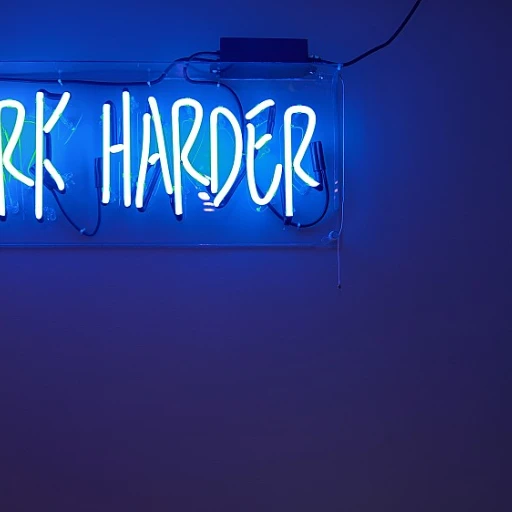Understanding AI's Role in HR Metrics
The Modern Workforce: A Data-Driven Journey
Artificial intelligence isn't just for futuristic movies anymore; it's here, shaking hands with human resources and revolutionizing the game. In today’s workforce, AI acts as a tool for transforming how organizations manage data, employee performance, and decision making. From managing mundane tasks to predicting the future of work, AI is redefining how HR impacts employee experience.AI Meets Workforce Metrics
The collaboration between artificial intelligence and HR metrics is a cocktail of endless opportunities for organizations. At the heart of this integration is data – yes, that seemingly infinite sea of numbers and text we sometimes lose ourselves in. Through AI, this data transforms into actionable insights which provide real time analytics, helping businesses make decisions that improve employee engagement and performance management. While traditional methods in human resources management relied heavily on spreadsheets and leading by gut-feel, AI introduces a layer of predictive analytics. This means the power to foresee trends in employee performance, talent acquisition, and even overhauling the hiring process with precision.From Traditional HR to AI-Powered Analytics
Imagine being able to predict which employees would thrive the most with talent management tools long before any personal interventions are needed. AI's predictive capabilities can be a game-changer, fuelled by data from every corner of your organization, forecasting future patterns and freeing up time for management to focus on growth and people.How AI Makes the HR World Round
From learning development to handling repetitive tasks, artificial intelligence streamlines HR operations, making them leaner and more effective. By minimizing manual labor and providing a constant stream of fresh insights, AI ensures that human resource departments are not bogged down by the day-to-day, but rather poised to engage employees in meaningful ways. If you want to explore AI's far-reaching impact, don't miss out on the AIHR Institute's analysis on how AI-powered workforce planning is changing the business scene. AIHR Institute on Workforce Planning Real stories of how AI-driven insights are propelling HR into a more strategic role will be addressed in parts to come, so stay tuned!Key Benefits of AI in HR Metrics
Benefits of Implementing Artificial Intelligence in Human Resource Analytics
Artificial Intelligence has ushered in a fresh perspective in human resources analytics, promising a cornucopia of advantages. HR departments that leverage AI tools experience enhanced efficiency and improved decision making capabilities. AI empowers organizations by making predictive analytics a game-changer. Imagine anticipating employee turnover before it happens – AI tools provide managers with valuable insights, allowing them to strategize effectively, thus preserving talent. This proactive approach not only saves time but fosters a positive employee experience. The nitty-gritty of talent acquisition becomes less cumbersome with AI. By streamlining the hiring process, ensuring the right person is hired for the job, organizations can optimize their talent management efforts. Thanks to AI-driven insights, engagement levels can spike, allowing focus on people who are inspired and productive.Streamlining Employee Performance and Engagement Metrics
Let's talk employee performance – a key aspect where AI shines brightly. AI tools can tap into real-time data, shedding light on productivity trends, commitment levels, and more. This data-driven approach turns the guessing game into a fine-tuned symphony of numbers and actionable insights. Employee engagement is equally vital. By utilizing AI-driven metrics, management can tailor strategies that genuinely resonate with the team. This fosters an atmosphere where employees feel heard and valued, which naturally enhances overall performance. Considering you might ponder, "What about routine HR activities?" AI liberates human resources professionals by automating repetitive tasks that once bogged them down. The mundane is now managed by machines, enabling HR to concentrate on activities that require a human touch. For those keen on exploring how organizations harness AI for better decision making, this resource on leveraging data-driven insights is a fantastic read.AI Tools and Technologies for HR Metrics
Exploring AI Tools in HR
Artificial intelligence has become a game-changer for human resources, especially when it comes to managing and analyzing data. The variety of AI tools available today can help HR teams make better decisions, improve employee engagement, and enhance the overall employee experience. Let's take a closer look at some of these tools and how they can be used effectively.
Predictive Analytics for Talent Management
Predictive analytics is a powerful tool that can forecast employee performance and identify potential talent gaps. By analyzing historical data, HR teams can predict which employees are likely to excel in specific roles, enabling more effective talent acquisition and workforce planning. This not only saves time in the hiring process but also ensures that the right people are placed in the right positions.
Machine Learning in Employee Engagement
Machine learning algorithms can analyze patterns in employee behavior and provide insights into engagement levels. By understanding what drives employee satisfaction, HR professionals can develop strategies to boost morale and productivity. For instance, real-time feedback systems powered by AI can give managers instant insights into employee sentiments, allowing for timely interventions.
AI-Driven Performance Management
Performance management is another area where AI tools shine. By continuously analyzing employee performance data, AI can identify trends and provide actionable insights. This helps managers to make informed decisions about promotions, training needs, and even compensation. With AI, performance reviews become more data-driven and less subjective, leading to fairer assessments.
Generative AI for Learning and Development
Generative AI is opening new doors in learning development by creating personalized training programs. These AI systems can adapt content to suit individual learning styles, making training more effective and engaging. This ensures that employees are not only learning but also retaining the information, which is crucial for skill development and career growth.
For more insights on how AI is revolutionizing HR processes, check out this article on AI's role in streamlining payroll processing.
Challenges and Ethical Considerations
Balancing Innovation with Responsibility
Artificial intelligence is reshaping how we manage human resources, offering exciting possibilities for data-driven insights and predictive analytics. However, as we embrace AI tools, it's crucial to tread carefully, considering both the challenges and ethical implications. AI's ability to analyze employee data in real-time can significantly enhance performance management and workforce planning, but it also raises questions about privacy and fairness.
Data Privacy and Security Concerns
One of the biggest challenges in using AI for HR is safeguarding employee data. With AI-driven analytics, organizations gather vast amounts of personal information, from performance metrics to employee engagement levels. This data needs robust protection to prevent breaches and misuse. Companies must ensure that their AI systems comply with data protection regulations, such as GDPR, to maintain trust and transparency with their workforce.
Bias and Fairness in AI Algorithms
Another hurdle is the potential for bias in AI algorithms. Machine learning models are only as good as the data they are trained on. If historical data reflects biases, AI systems may perpetuate these biases in decision-making processes, affecting talent acquisition and employee performance evaluations. It's essential for organizations to regularly audit their AI tools to ensure fairness and inclusivity in their HR practices.
Employee Experience and Trust
AI's impact on the employee experience is a double-edged sword. While it can streamline repetitive tasks and improve efficiency, it can also lead to concerns about surveillance and job security. Employees might feel uneasy knowing that AI is monitoring their performance in real-time. Transparent communication and involving employees in the AI integration process can help alleviate these concerns and foster trust.
Ethical Use of AI in HR
Ethical considerations should be at the forefront of any AI-driven HR initiative. Organizations must establish clear guidelines for the ethical use of AI, ensuring that its implementation aligns with the company's values and respects employee rights. This involves setting boundaries on how AI is used in talent management and the hiring process, ensuring that human oversight remains a critical component of decision-making.
As we continue to explore the potential of AI in HR, it's vital to address these challenges head-on. By prioritizing data privacy, fairness, and ethical use, organizations can harness AI's power responsibly, paving the way for a future where technology and human resources work hand in hand to enhance employee engagement and drive organizational success.








